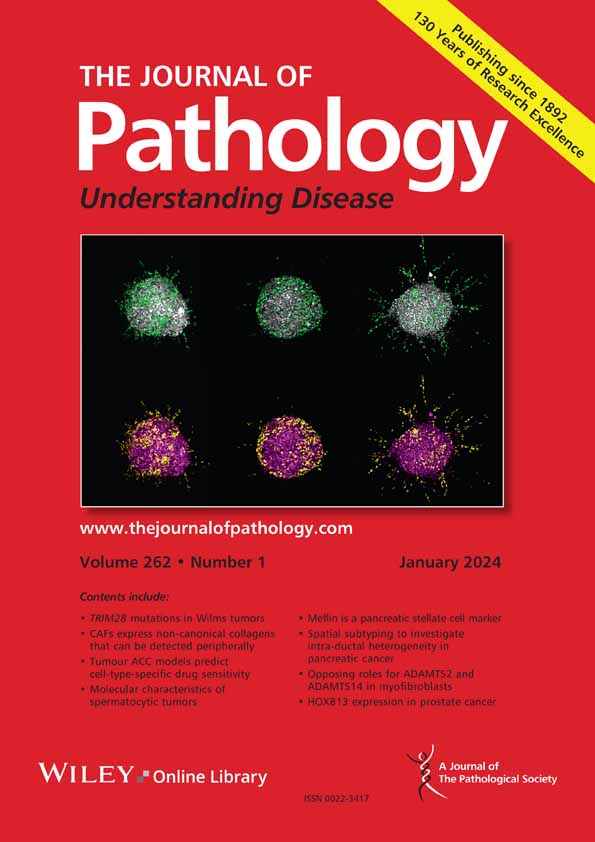Yongsong Yong, Richard Demmler, Bisan Abdalfatah Zohud, Qi Fang, Tong Zhang, Yonghua Zhou, Katja Petter, Christian Flierl, Tobias Gass, Carol I Geppert, Susanne Merkel, Vera S Schellerer, Elisabeth Naschberger, Michael Stürzl
下载PDF
{"title":"AMIGO2 characterizes cancer-associated fibroblasts in metastatic colon cancer and induces the release of paracrine active tumorigenic secretomes","authors":"Yongsong Yong, Richard Demmler, Bisan Abdalfatah Zohud, Qi Fang, Tong Zhang, Yonghua Zhou, Katja Petter, Christian Flierl, Tobias Gass, Carol I Geppert, Susanne Merkel, Vera S Schellerer, Elisabeth Naschberger, Michael Stürzl","doi":"10.1002/path.6363","DOIUrl":null,"url":null,"abstract":"<p>Secretomes of cancer-associated fibroblasts (CAFs) in colorectal cancer (CRC) contribute to malignancy. Detailed knowledge is available on the components and functions of CAF secretomes. Little is known about the regulation of CAF secretomes. Here, we searched for receptor-like membrane-bound molecules in CAFs, which may regulate the production and release of tumor-activating secretomes. The adhesion molecule with Ig-like domain 2 (AMIGO2) was significantly upregulated in cultivated CAFs compared to normal tissue-associated fibroblasts (NAFs), and this was confirmed in patient-derived tissues. AMIGO2 expression was low or absent in healthy colon, significantly increased in fibroblasts of primary CRC, and highest in the stromal tissues of CRC-derived liver metastases. AMIGO2 expression in CAFs correlated with a higher T-category, increased lymph node metastasis, progressed tumor stages and was associated with reduced survival in different cohorts of CRC patients. Interestingly, AMIGO2 expression was induced by transforming growth factor-β and higher in female patients, who exhibit a more aggressive disease course. In functional studies, conditioned media of NAFs with experimentally induced AMIGO2 overexpression enhanced proliferation and migration of different CRC tumor cells, while siRNA-mediated inhibition of AMIGO2 in CAFs attenuated these effects. Accordingly, therapeutic inhibition of the receptor-like AMIGO2 protein in CRC CAFs could prevent tumorigenic secretomes in CRC. © 2024 The Author(s). <i>The Journal of Pathology</i> published by John Wiley & Sons Ltd on behalf of The Pathological Society of Great Britain and Ireland.</p>","PeriodicalId":232,"journal":{"name":"The Journal of Pathology","volume":"265 1","pages":"14-25"},"PeriodicalIF":5.6000,"publicationDate":"2024-11-11","publicationTypes":"Journal Article","fieldsOfStudy":null,"isOpenAccess":false,"openAccessPdf":"https://www.ncbi.nlm.nih.gov/pmc/articles/PMC11638658/pdf/","citationCount":"0","resultStr":null,"platform":"Semanticscholar","paperid":null,"PeriodicalName":"The Journal of Pathology","FirstCategoryId":"3","ListUrlMain":"https://onlinelibrary.wiley.com/doi/10.1002/path.6363","RegionNum":2,"RegionCategory":"医学","ArticlePicture":[],"TitleCN":null,"AbstractTextCN":null,"PMCID":null,"EPubDate":"","PubModel":"","JCR":"Q1","JCRName":"ONCOLOGY","Score":null,"Total":0}
引用次数: 0
引用
批量引用
Abstract
Secretomes of cancer-associated fibroblasts (CAFs) in colorectal cancer (CRC) contribute to malignancy. Detailed knowledge is available on the components and functions of CAF secretomes. Little is known about the regulation of CAF secretomes. Here, we searched for receptor-like membrane-bound molecules in CAFs, which may regulate the production and release of tumor-activating secretomes. The adhesion molecule with Ig-like domain 2 (AMIGO2) was significantly upregulated in cultivated CAFs compared to normal tissue-associated fibroblasts (NAFs), and this was confirmed in patient-derived tissues. AMIGO2 expression was low or absent in healthy colon, significantly increased in fibroblasts of primary CRC, and highest in the stromal tissues of CRC-derived liver metastases. AMIGO2 expression in CAFs correlated with a higher T-category, increased lymph node metastasis, progressed tumor stages and was associated with reduced survival in different cohorts of CRC patients. Interestingly, AMIGO2 expression was induced by transforming growth factor-β and higher in female patients, who exhibit a more aggressive disease course. In functional studies, conditioned media of NAFs with experimentally induced AMIGO2 overexpression enhanced proliferation and migration of different CRC tumor cells, while siRNA-mediated inhibition of AMIGO2 in CAFs attenuated these effects. Accordingly, therapeutic inhibition of the receptor-like AMIGO2 protein in CRC CAFs could prevent tumorigenic secretomes in CRC. © 2024 The Author(s). The Journal of Pathology published by John Wiley & Sons Ltd on behalf of The Pathological Society of Great Britain and Ireland.
AMIGO2 是转移性结肠癌中癌症相关成纤维细胞的特征,可诱导释放旁分泌型活性致癌分泌物。
结直肠癌(CRC)中癌症相关成纤维细胞(CAF)的分泌物组是导致恶性肿瘤的原因之一。人们对 CAF 分泌物的成分和功能有详细的了解。但对 CAF 分泌物的调控却知之甚少。在这里,我们寻找了CAF中可能调控肿瘤激活分泌物的产生和释放的类似受体的膜结合分子。与正常组织相关成纤维细胞(NAFs)相比,具有Ig样结构域2的粘附分子(AMIGO2)在培养的CAFs中明显上调,这一点在患者衍生组织中得到了证实。AMIGO2在健康结肠中表达量较低或没有表达,在原发性 CRC 的成纤维细胞中表达量明显增加,而在 CRC 来源的肝转移瘤的基质组织中表达量最高。在不同组别的 CRC 患者中,CAFs 中 AMIGO2 的表达与较高的 T 类、淋巴结转移增加、肿瘤分期进展相关,并与生存率降低有关。有趣的是,AMIGO2 的表达受转化生长因子-β 的诱导,女性患者的表达更高,她们的病程更具侵袭性。在功能研究中,实验诱导 AMIGO2 过度表达的 NAFs 的条件培养基增强了不同 CRC 肿瘤细胞的增殖和迁移,而 siRNA 介导的 CAFs 中 AMIGO2 的抑制则减弱了这些效应。因此,治疗性抑制 CRC CAFs 中的受体样 AMIGO2 蛋白可预防 CRC 中的致瘤分泌物。© 2024 作者。病理学杂志》由 John Wiley & Sons Ltd 代表大不列颠及爱尔兰病理学会出版。
本文章由计算机程序翻译,如有差异,请以英文原文为准。



 求助内容:
求助内容: 应助结果提醒方式:
应助结果提醒方式:


